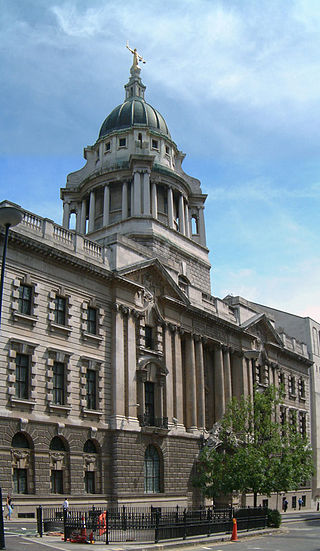This article addresses torts in United States law. As such, it covers primarily common law. Moreover, it provides general rules, as individual states all have separate civil codes. There are three general categories of torts: intentional torts, negligence, and strict liability torts.
A legal remedy, also referred to as judicial relief or a judicial remedy, is the means with which a court of law, usually in the exercise of civil law jurisdiction, enforces a right, imposes a penalty, or makes another court order to impose its will in order to compensate for the harm of a wrongful act inflicted upon an individual.
Hadley & Anor v Baxendale& Ors [1854] EWHC J70 is a leading English contract law case. It sets the leading rule to determine consequential damages from a breach of contract: a breaching party is liable for all losses that the contracting parties should have foreseen. However, if the other party has special knowledge that the party-in-breach does not, the breaching party is only liable for the losses that he could have foreseen on the information available to him.

In common law jurisdictions, a misrepresentation is a false or misleading statement of fact made during negotiations by one party to another, the statement then inducing that other party to enter into a contract. The misled party may normally rescind the contract, and sometimes may be awarded damages as well.
Causation is the "causal relationship between the defendant's conduct and end result". In other words, causation provides a means of connecting conduct with a resulting effect, typically an injury. In criminal law, it is defined as the actus reus from which the specific injury or other effect arose and is combined with mens rea to comprise the elements of guilt. Causation only applies where a result has been achieved and therefore is immaterial with regard to inchoate offenses.
Causation in English law concerns the legal tests of remoteness, causation and foreseeability in the tort of negligence. It is also relevant for English criminal law and English contract law.
In English law, remoteness between a cause of action and the loss or damage sustained as a result is addressed through a set of rules in both tort and contract, which limit the amount of compensatory damages available for a wrong.

Bartlett v Barclays Bank Trust Co Ltd [1980] 1 Ch 515 in an English trusts law case. In it Brightman J gave a comprehensive discussion of the duties of trustees in connection with companies whose shares are part of the trust property. Although it is common to hear lawyers refer to "the rule in Bartlett v Barclays Bank", the case only restated law that had been accepted since Speight v Gaunt.

Expectation damages are damages recoverable from a breach of contract by the non-breaching party. An award of expectation damages protects the injured party's interest in realising the value of the expectancy that was created by the promise of the other party. Thus, the impact of the breach on the promisee is to be effectively "undone" with the award of expectation damages.

Fairchild v Glenhaven Funeral Services Ltd [2002] UKHL 22 is a leading case on causation in English tort law. It concerned malignant mesothelioma, a deadly disease caused by breathing asbestos fibres. The House of Lords approved the test of "materially increasing risk" of harm, as a deviation in some circumstances from the ordinary "balance of probabilities" test under the "but for" standard.

Torquay Hotel Co Ltd v Cousins [1968] EWCA Civ 2 (BAILII) is a UK labour law case concerning the liability of a union when its members take industrial action.
Robinson v Kilvert (1889) LR 41 ChD 88 is an English tort law case concerning nuisance. It deals with what is sometimes called the issue of a "sensitive claimant".

Attorney General v Blake[2000] UKHL 45, [2001] 1 AC 268 is a leading English contract law case on damages for breach of contract. It established that in some circumstances, where ordinary remedies are inadequate, restitutionary damages may be awarded.

Hochster v De La Tour[1853] EWHC J72 (QB) is a landmark English contract law case on anticipatory breach of contract. It held that if a contract is repudiated before the date of performance, damages may be claimed immediately.

Addis v Gramophone Co Ltd [1909] AC 488 is an old English contract law and UK labour law case, which used to restrict damages for non-pecuniary losses for breach of contract.

Parsons (Livestock) Ltd v Uttley Ingham & Co Ltd [1978] QB 791 is an English contract law case, concerning remoteness of damage. In it, the majority held that losses for breach of contract are recoverable if the type or kind of loss is a likely result of the breach of contract. Lord Denning MR, dissenting on the reasoning, held that a distinction should be drawn between losses for physical damage and economic losses.

Williams v Natural Life Health Foods Ltd[1998] UKHL 17 is an important English tort law, company law and contract law case. It held that for there to be an effective assumption of responsibility, there must be some direct or indirect conveyance that a director had done so, and that a claimant had relied on the information. Otherwise only a company itself, as a separate legal person, would be liable for negligent information.

OBG Ltd v Allan[2007] UKHL 21 was a combined appeal with Douglas v Hello! Ltd and Mainstream Properties Ltd v Young and stands as the leading case on economic torts in English law.

Bettini v Gye (1876) 1 QBD 183 is an English contract law case, concerning the right to terminate performance of a contract.

C&P Haulage Co Ltd v Middleton [1983] EWCA Civ 5 is an English contract law case, concerning damages for costs incurred by a claimant related to a defendant's breach of contract.











